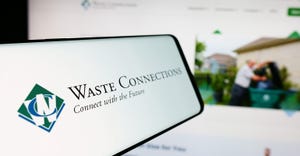Seattle Flagging 300 Customers Daily as Food Waste Ban Takes Effect
Days into enforcing its new ban on food waste, Seattle Public Utilities is flagging close to 300 customers a day–or 1 percent of its collection base–for throwing away too much food, food scraps and other compostable materials.
Effective Jan. 1, residents and business are now required to compost 90 percent or more of their food waste and food-contaminated paper napkins, paper towels and cardboard, such as pizza boxes. Those who continue to trash large amounts of food will have their garbage tagged and receive a violation notification on their bi-monthly bill.
Following a six-month education and implementation period, the city will begin issuing fines. Starting July 1, residents breaking the food waste law will receive a fine of $1 per week and multifamily and commercial customers will receive two warnings and then a $50 fine for each additional infraction.
“If people are trying to do the right thing and recycling and composting as much as they can, they shouldn’t have anything to worry about it,” says Brett Stav, senior planning and development specialist for Seattle Public Utilities (SPU), which projects that the food waste law will divert 38,000 tons of food scraps from the landfill and help the city achieve its goal of recycling and composting 60 percent of its waste by the end of 2015.
Even if the city achieves its first year goal, it will still send an estimated 62,000 tons of annual food waste 300 miles to a landfill in Eastern Oregon.
“The thinking behind the new food requirements is that they will act as sort of a spark for folks to try to change their routines and think about the things that they are throwing away not as waste but as a wasted resource,” Stav says. “Seattle is sending about 125,000 tons of organics to our compost facility every year but there’s that other 100,000 that we’re not capturing and it’s pretty equally split up between businesses and residents.”
Composting food scraps isn’t new for Seattle whose residents who have enjoyed curbside food waste collection since 2005. In 2009, the city required all residents to either subscribe to food and yard waste collection or participate in backyard composting. Since late 2011, multifamily buildings have been required to provide compost collection for their residents.
“So really we’ve been doing it for almost 10 years and people have been paying for the service for the last five. We’ve found that most of the people have been utilizing the service,” Stav says. “There has probably been 10 to 20 percent not utilizing the service but they have been paying for it. This program is really getting that last 10 to 20 percent to use it more regularly.”
New Composting Rules for Businesses
The new law also requires that commercial establishments that generate food waste and compostable paper to subscribe to a composting service, compost their food waste on-site or self-haul their food waste for processing.
That has translated in a significant influx of new customers for Recology CleanScapes, one of two haulers that contracts with the city to collect its waste. The company estimates it has seen a 30 percent increase in commercial food waste customers since November.
“There has been a lot of interest both from residents and commercial customers. It has been an opportunity for us to educate them on where to properly place materials,” says Kevin Kelly, government and community relations manager for Recology, which collects waste in about half of the city. “By the time that July 1 rolls around customers will have been thoroughly educated on what goes in which bin. So I think the level of contaminants will decline significantly.”
Implementation has been smooth so far. Contrary to what one might think, drivers only need to spend seconds to visually inspect the trash for excess food waste, Kelly said.
“There are already programs in place where we look for contamination so it’s not as if we’re doing anything out of the ordinary,” Kelly says.
The city prohibited yard waste from the garbage in 1988 and recyclables in 2005. Drivers leave a tag for the resident and log the violation using onboard technology.
“We’re not slowing down to rip open bags. They don’t spend time sifting through materials to determine the exact level of contamination. We’re talking obvious contamination.”
Residents and businesses appear to be embracing the new regulations.
“They understand the city’s desire to divert more material from landfills. They understand it is a better use for food scraps, which includes turning it into compost,” Kelly says. “The city of Seattle is excited to be an environmental leader.”
About the Author
You May Also Like


